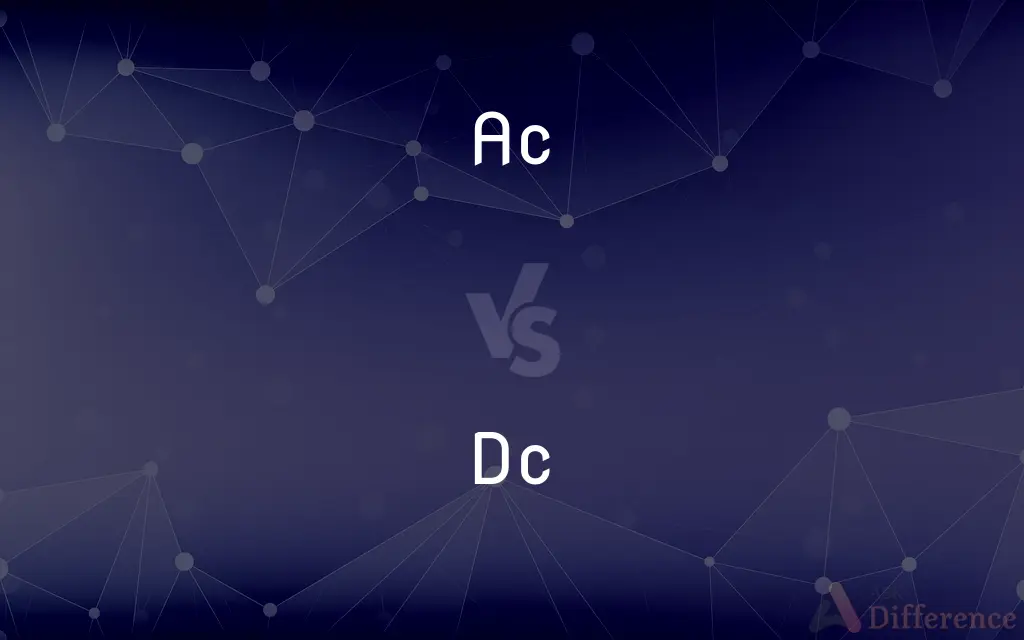AC vs. DC — What's the Difference?
Edited by Tayyaba Rehman — By Maham Liaqat — Updated on April 18, 2024
AC (Alternating Current) changes direction periodically and is used for power distribution due to its efficiency over long distances; DC (Direct Current) maintains a constant direction, ideal for electronics and battery storage.

Difference Between AC and DC
Table of Contents
ADVERTISEMENT
Key Differences
AC, or alternating current, is characterized by the flow of electric charge that periodically reverses direction. This feature allows for efficient transmission of electricity over long distances with minimal energy loss. On the other hand, DC, or direct current, maintains a constant flow of electric charge in one direction, making it stable and predictable for devices that require a consistent voltage level.
While AC is the standard used in most home and industrial power supplies due to its ability to be easily transformed between high and low voltages, DC is preferred in applications like electronic devices, electric vehicles, and solar power systems, where batteries store power as DC. This is because DC’s consistent voltage is ideal for sensitive electronics that require stable power.
Transformers, which are critical for adjusting voltage levels, work only with AC. This capability is essential for efficient power distribution, as high voltages can be used for transmission to reduce losses, then lowered for safe home and business use. Conversely, DC cannot be easily transformed, which was a major limitation before the development of modern electronic technology that allows for efficient DC to AC conversion.
AC power systems can deliver power across vast networks, such as national grids, with stations that handle the conversion and regulation of voltages. DC systems, while improving with technology, are generally used in more localized settings, like inside electronic devices or for linking power grids through high-voltage DC (HVDC) transmission.
Electrical safety with AC and DC also differs; AC's alternating nature can be more dangerous in certain situations due to it potentially causing more severe muscular contractions. However, DC tends to be less risky at lower voltages but can be more dangerous at high voltages because it causes a continuous current which can lead to thermal burns.
ADVERTISEMENT
Comparison Chart
Current Flow
Changes direction periodically
Constant in one direction
Transmission
Efficient over long distances
Typically used for short distances
Main Uses
General grid power supply, large appliances
Electronics, battery storage, electric vehicles
Voltage Transformation
Easily transformed with transformers
Requires complex electronics to transform
Safety
Can cause severe muscular contractions
Lower risk at low voltages, higher at high
Compare with Definitions
Ac
Used in power distribution.
AC is transmitted through power lines across cities.
Dc
Constant voltage supply.
DC is preferred for devices that require stable voltage.
Ac
Fluctuating voltage.
AC voltage in homes typically varies to accommodate different appliance needs.
Dc
Difficult to transform.
Special electronic devices are needed to change DC voltage levels.
Ac
Electric current that reverses direction.
The home appliances run on AC from the main power supply.
Dc
Used in electronics.
Most personal electronics utilize DC for safe and efficient operation.
Ac
Can be easily transformed.
AC voltage is increased for efficient long-distance transmission.
Dc
Used in solar panels.
Solar panels generate DC, which is then converted to AC for home use.
Ac
Powers large appliances.
Air conditioners and refrigerators typically use AC power.
Dc
Electric current flows in one direction.
Batteries supply DC to power portable devices.
Ac
Account; money of account
Dc
A person's child (particularly used in online forums)
My eldest DC is starting reception tomorrow
Ac
Alicyclic
Dc
Alternative case form of DC
Ac
Abbreviation of acre
Dc
(crochet) double crochet
Ac
(electricity) alternating current
Dc
The district occupied entirely by the city of Washington; chosen by George Washington as the site of the nation's capital and carve out of land ceded by Maryland and Virginia
Ac
(medicine) ante cibum, before meals
Dc
An electric current that flows in one direction steadily
Ac
The chemical symbol for actinum, a radioactive element.
Ac
An electric current that reverses direction sinusoidally. Alternative to direct curent, DC.
Ac
A radioactive element of the actinide series; found in uranium ores
Ac
An electric current that reverses direction sinusoidally;
In the US most household current is AC at 60 cycles per second
Common Curiosities
What is DC used for?
DC is used in battery storage, electronics, and solar panels.
How do transformers work with AC?
Transformers change the voltage of AC to higher levels for transmission and lower levels for usage.
Why is DC considered more stable for electronics?
DC provides a constant voltage, which is necessary for the sensitive components in electronic devices.
What are the advantages of DC over AC?
DC provides a constant and stable power supply, essential for digital electronics and battery storage.
How do voltage levels affect AC and DC usage?
High voltages can be used with AC for efficient transmission, whereas DC typically operates at lower, safer voltages.
What is AC used for?
AC is primarily used for distributing power across long distances and powering large appliances.
Why can AC be transmitted over long distances efficiently?
AC can be easily transformed to high voltages, reducing energy loss during transmission.
What are the safety concerns with AC and DC?
AC can cause severe muscular contractions, while DC at high voltages poses risks of thermal burns.
What role do inverters play with DC?
Inverters convert DC to AC, particularly useful in systems like solar panels and in homes.
How is AC converted to DC?
This is typically done using a rectifier, a device that converts AC to DC.
What are the advantages of AC over DC?
AC is easier to transform and more efficient for long-distance power distribution.
Why do electronic devices use DC?
Electronic devices require stable, constant voltage, which DC can provide.
Can DC be used for power transmission?
Yes, but it is typically used for high-voltage DC (HVDC) transmission systems linking different power grids.
Is DC safer than AC?
At lower voltages, DC is generally safer; however, at higher voltages, its continuous nature can be more hazardous.
Why was AC chosen for power grids?
The ability to easily transform and efficiently transmit AC over distances made it ideal for early power grid systems.
Share Your Discovery

Previous Comparison
Polyurethane vs. Varnish
Next Comparison
Acknowledge vs. CreditAuthor Spotlight
Written by
Maham LiaqatEdited by
Tayyaba RehmanTayyaba Rehman is a distinguished writer, currently serving as a primary contributor to askdifference.com. As a researcher in semantics and etymology, Tayyaba's passion for the complexity of languages and their distinctions has found a perfect home on the platform. Tayyaba delves into the intricacies of language, distinguishing between commonly confused words and phrases, thereby providing clarity for readers worldwide.















































